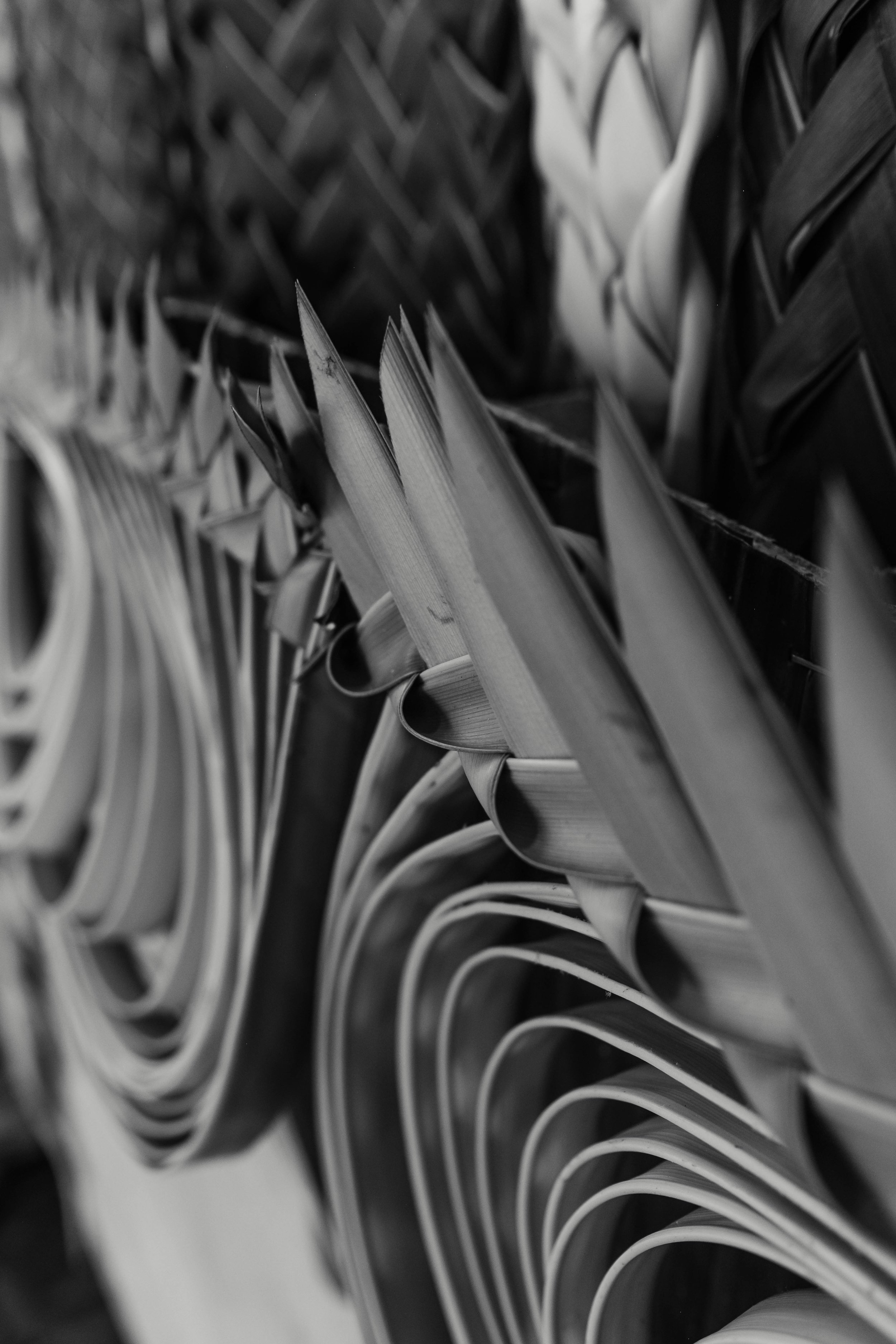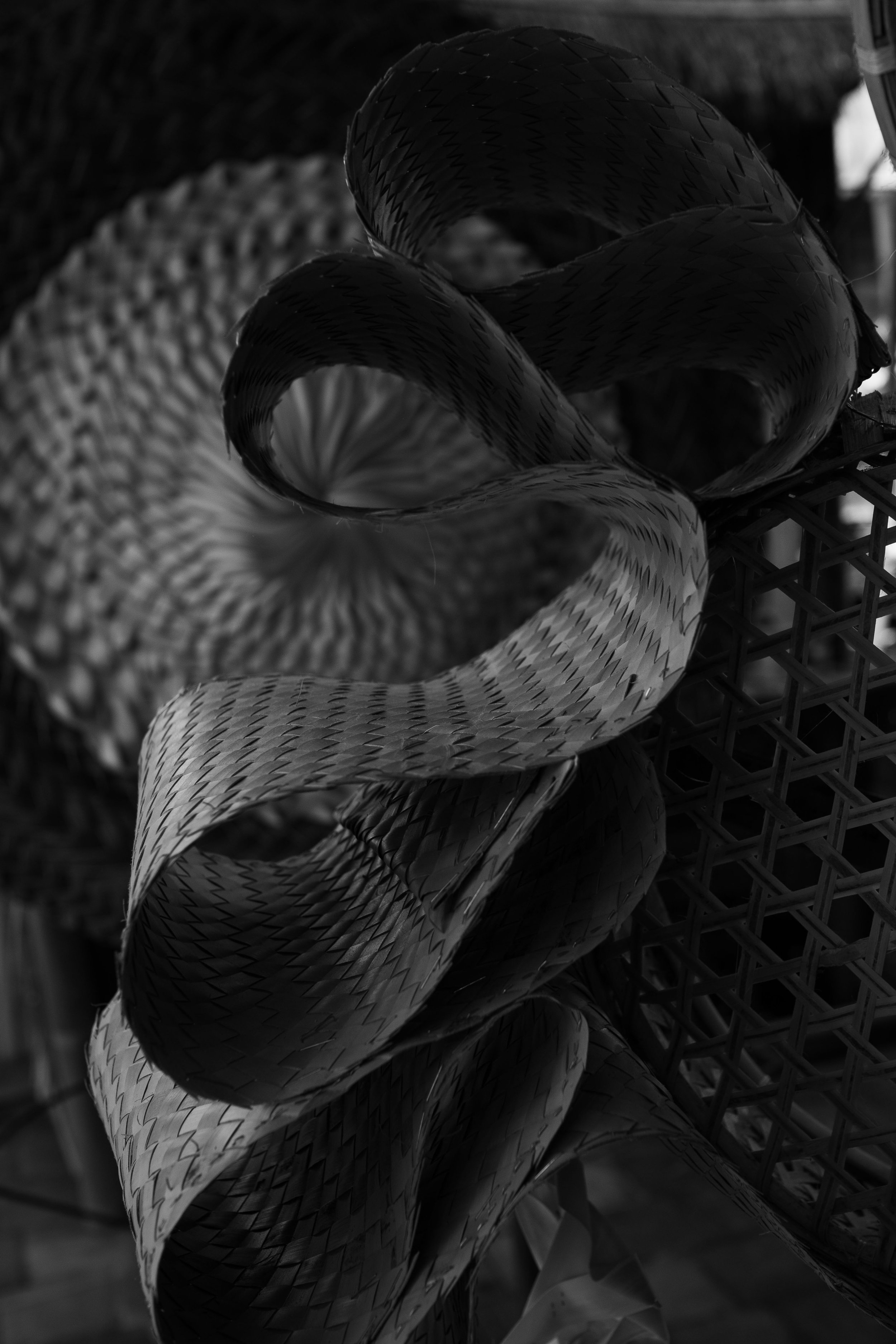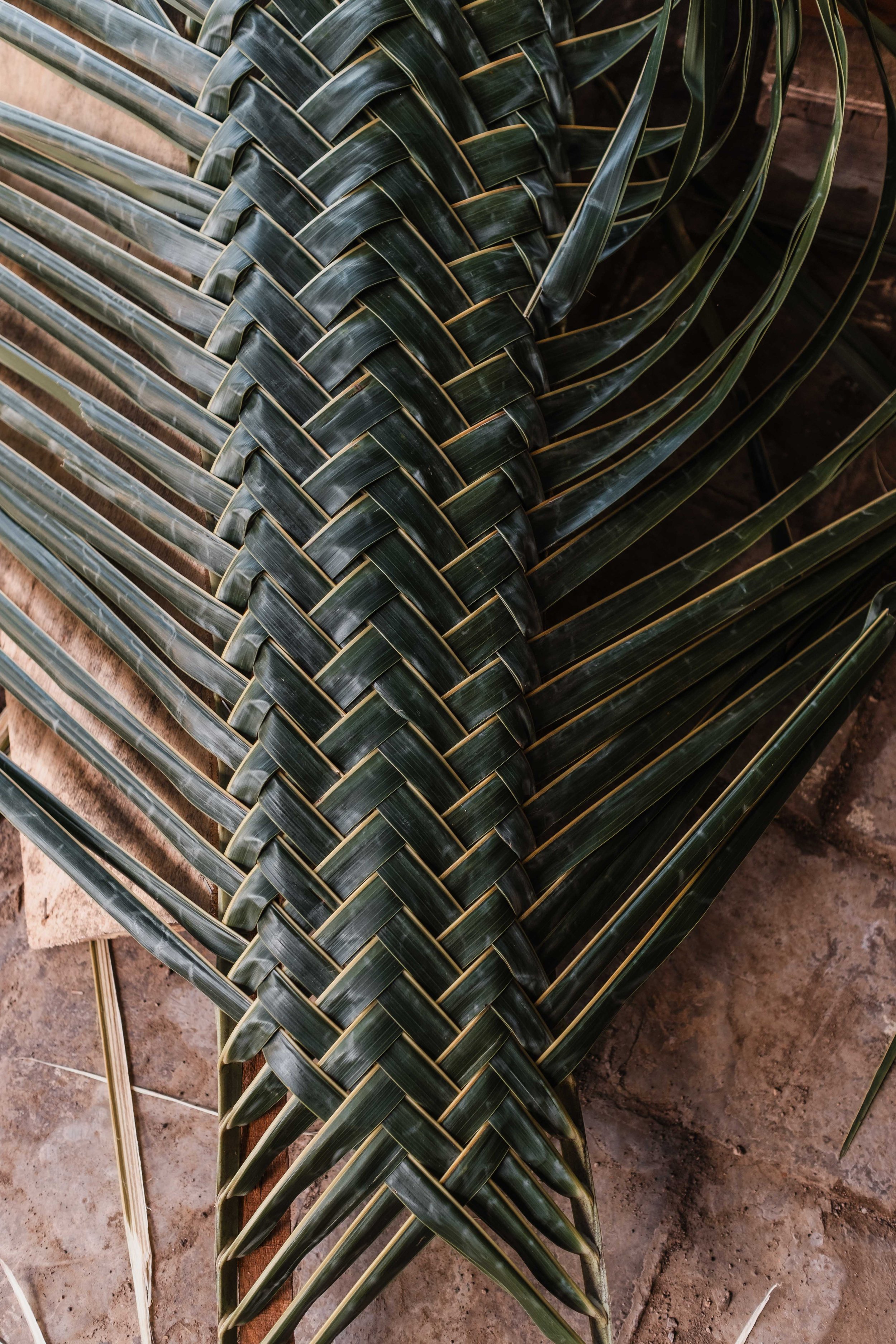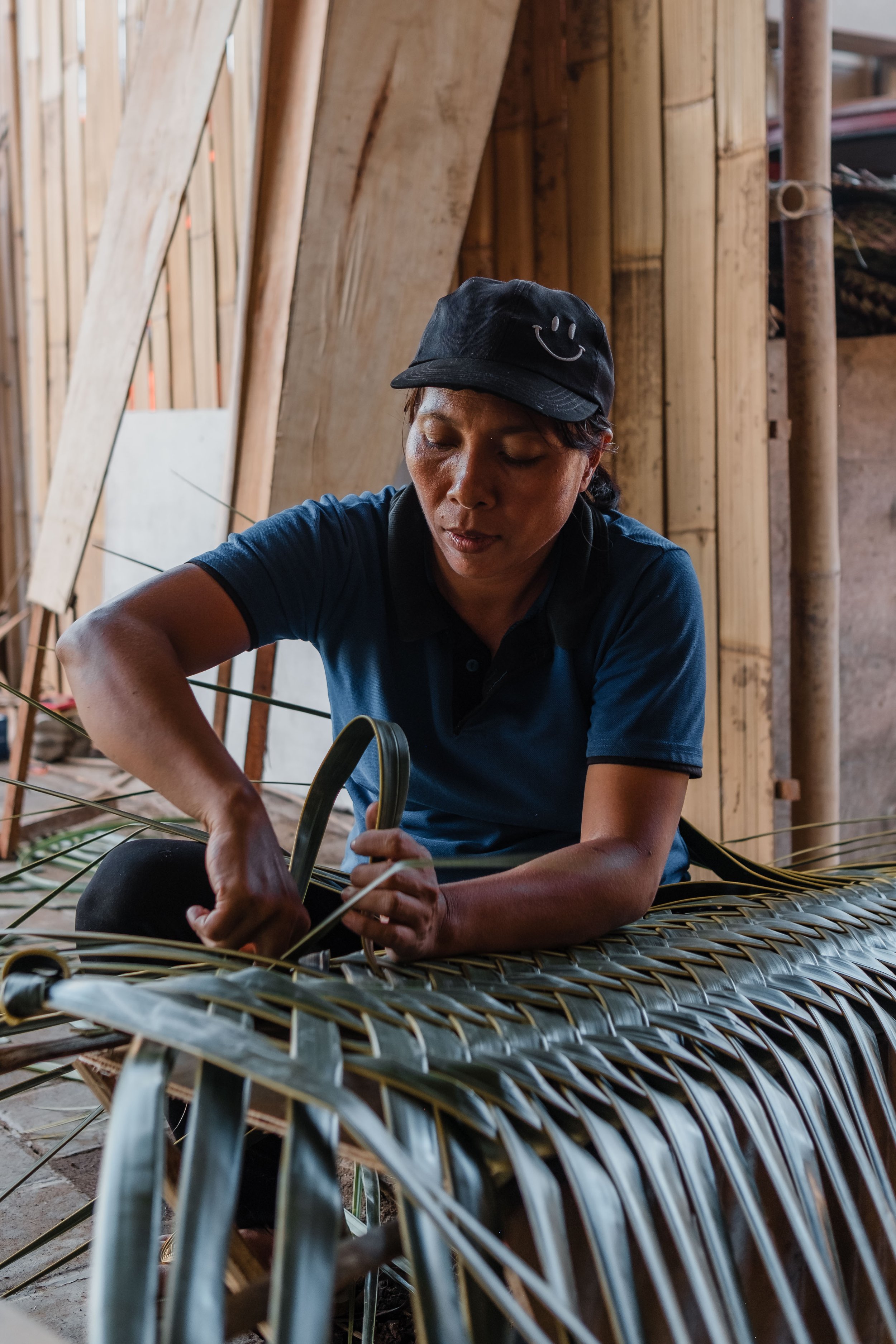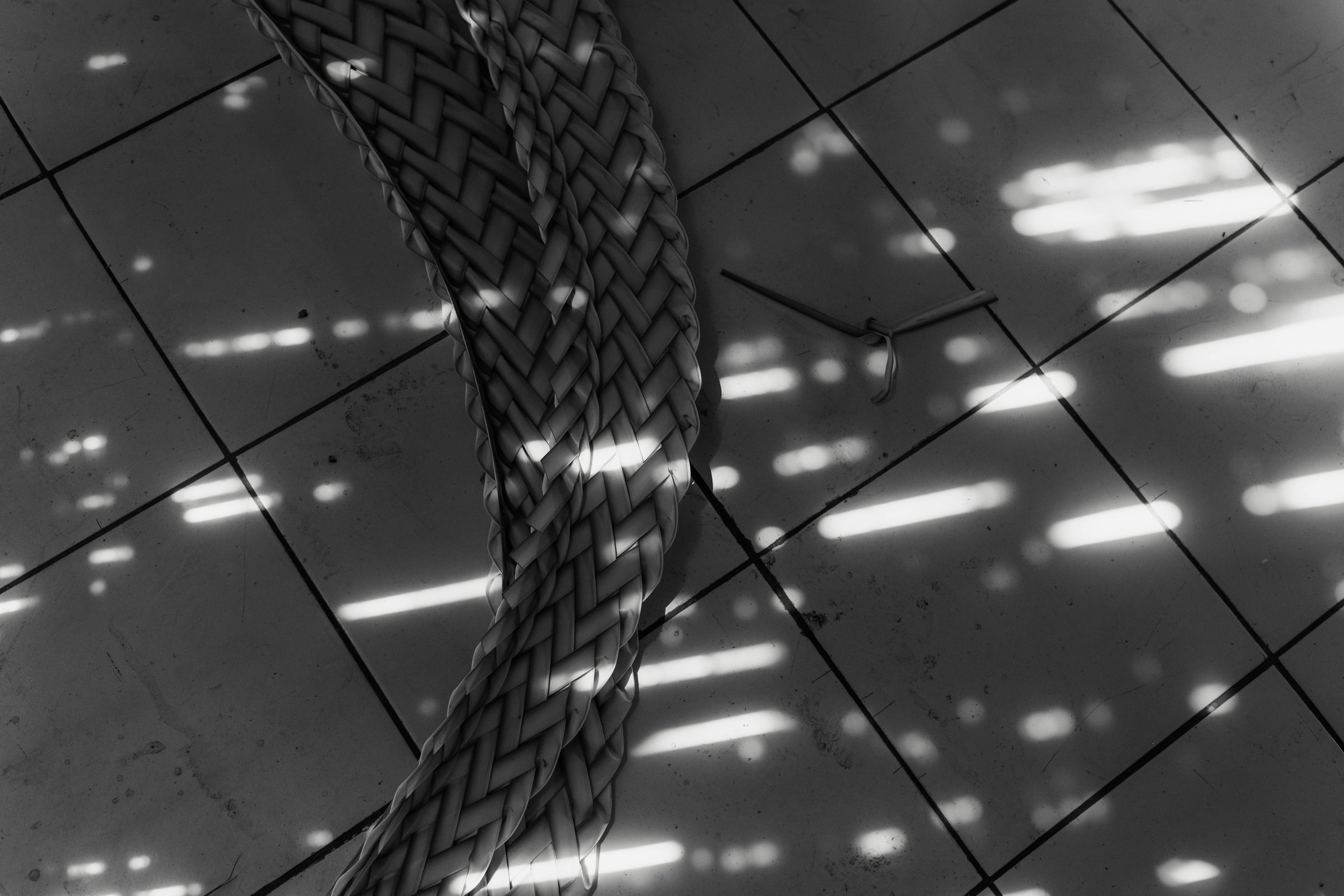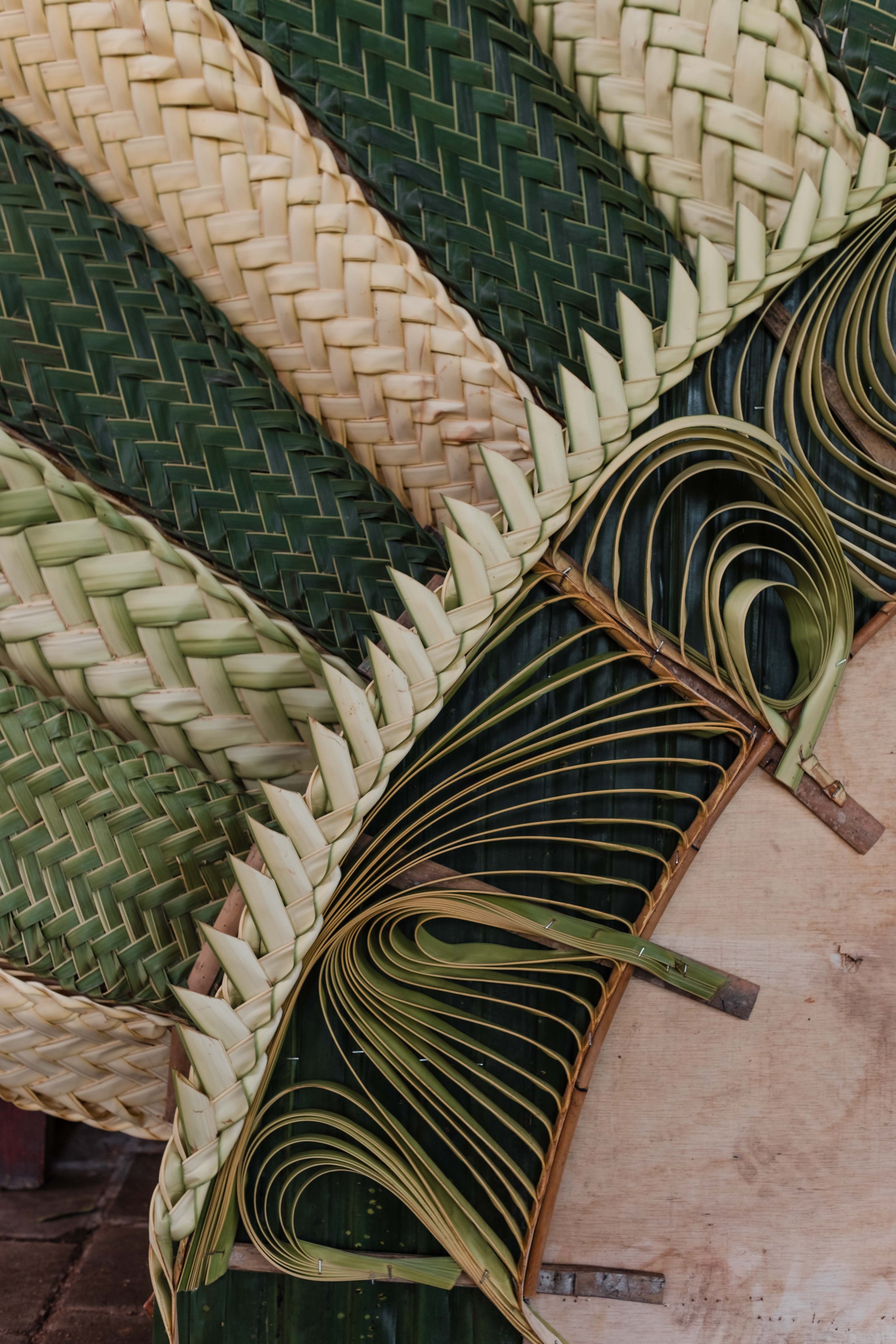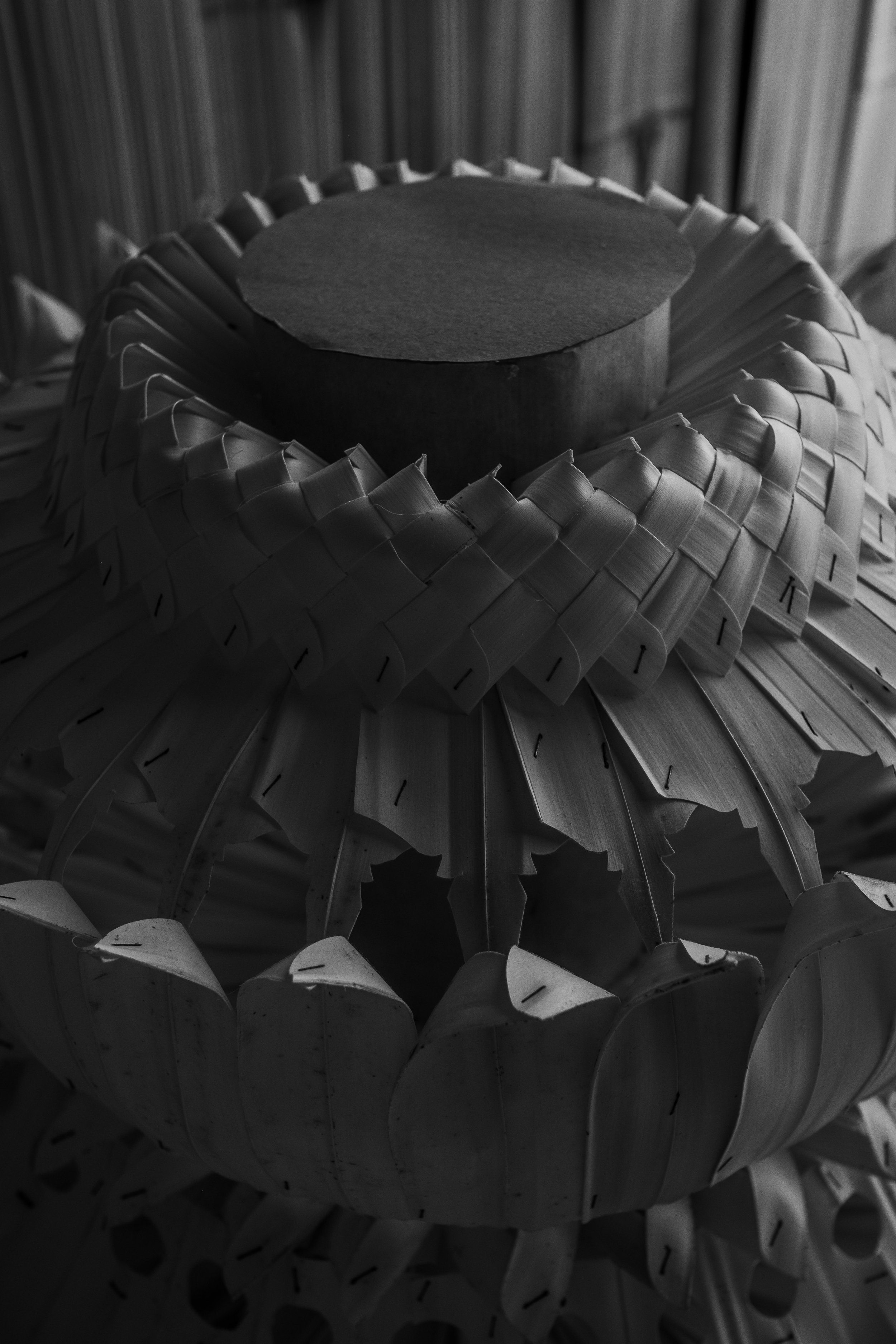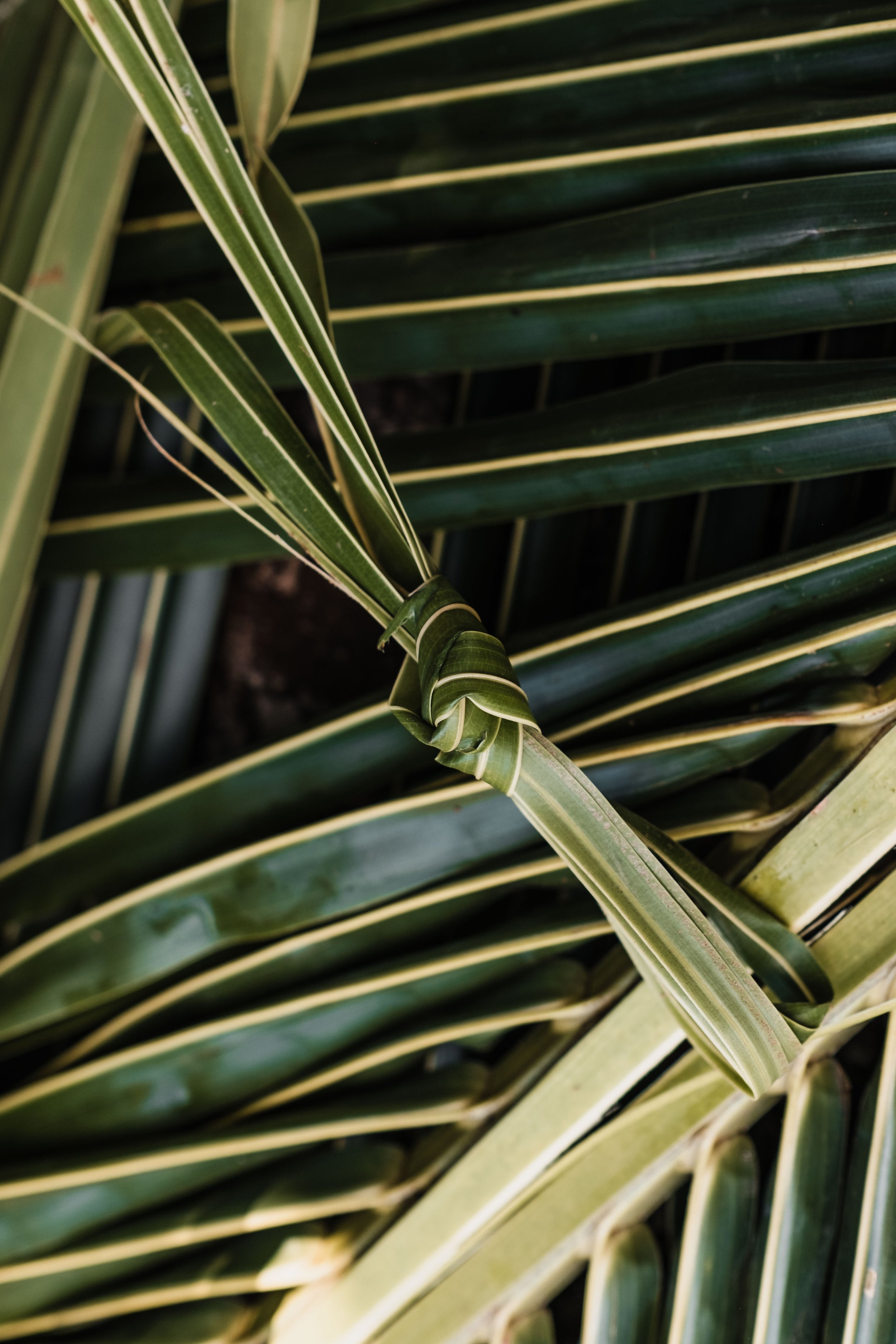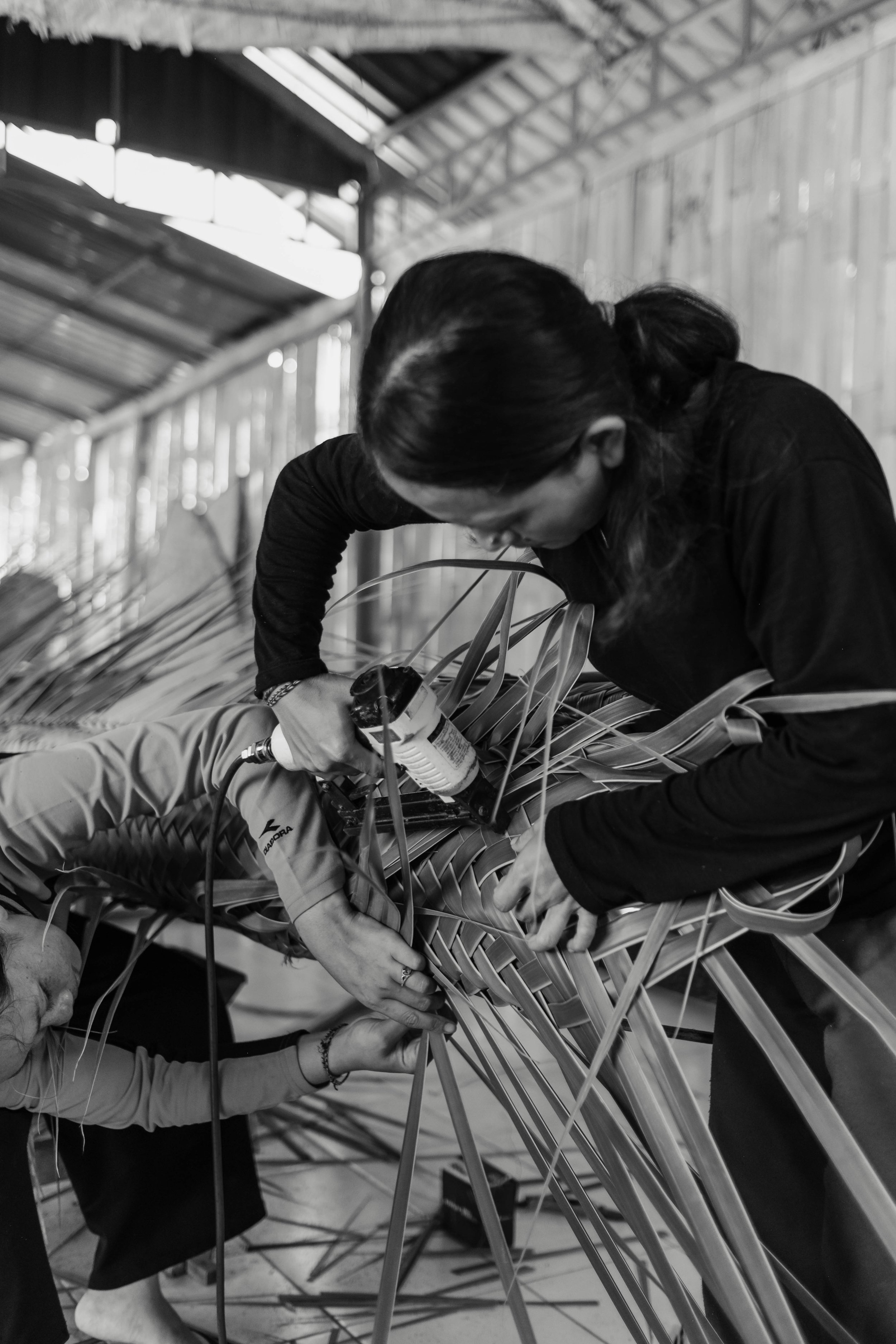Make a scene - leaf creation
An Interview with Chloe rose Quinn, creative director
When and how did you first come to Bali and what did you think of the island and its people?
I first came out to Bali on holiday in my first year of University. We stayed in a homestay in a very traditional village called Bona and the family were so welcoming, immersing us in Balinese culture. On that first trip I fell in love with the island. I was completely taken by the culture, the religion, the temples, and I particularly noticed the beauty of the handmade offerings (canangs). It was like living in a fairyland. I have always been into crafts and making things by hand. In seeing the intricacy, variety and beauty of what is made for ceremonies, I knew I was in a creative’s paradise. It’s the place that makes my soul happy and the place that gives me permission not to relinquish my inner child for exploration and play.
What made you open Make A Scene? Why leaf creation?
The family I was staying with introduced me to a local workshop that built and installed carved polystyrene wedding dekorasi. They were prepared to take me on as an apprentice so I took the plunge and moved here for a 6 months trial period in 2017. I joined a ‘Women in Transition’ course here in Bali alongside my apprenticeship with the décor company. This 4 month course became the foundation block for developing my new business idea. I knew I wanted to call it ‘Make A Scene!’ I come from a theatre background. My degree is in Set and Costume design, ‘Make A Scene’ is a play on words as I have been trained to transform spaces into scenes that tell stories from plays.
During the course of the business start-up course I became increasingly aware of the un-sustainability of the materials used for the traditional decoration and this kept raising questions in my mind. People kept telling me how important it was to find green alternatives, because it was all styrofoam, paint and fabric at that point, really not eco-friendly. At that time, 7 years ago all the entrances to ceremonies and weddings were made from styrofoam or synthetic (non recyclable) materials. Serendipitously I discovered Gus Ari on Facebook who was working entirely with green, recyclable, biodegradable materials. He was a real pioneer in Bali, using the same traditional, ornate ceremonial entranceway forms and designs, but making them entirely out of coconut leaf. I was bowled over by the beauty of their weaving. This was weaving in a whole different light. For me it was art. I instantly knew I had found a very special material that excited me and would become my new source of inspiration and focus. It was like my love for Balinese canang but in life-size forms! Could I really be on the cusp of start a business that created real-life fairy kingdoms for special events?
It was the best move I’ve ever made and Bali has looked after me ever since. Art is of the essence in Bali. For creatives it is a culture that is very experimental, skilled and above all accessible. If you have an idea, people will do their upmost to make it a reality. I have found them to be incredibly enterprising and willing to try something new. Artists and craftsmen will share their work, their space, their skill. They are not guarded, they do not fear competition from you, they are eager to share skills and their knowhow. As a Westerner, there have been no barriers whatsoever. They are delighted to explore my ideas of design which incorporate their crafts. They have been keen to assimilate/introduce the contemporary to their traditional.
How long have you had the business for and how has it changed over the years?
I have been in Bali for seven years and Make A Scene has been growing for six and a half of those. When Gus Ari and I first started working together, we were still doing quite traditional decorations. The team’s openness and enthusiasm to hear my western ideas and a ‘contemporary take’ on their traditional work really enlarged the possibilities for our designs. In addition, every new request from customers who ask us to interpret their ideas in woven leaf stretches us and keeps our portfolio diverse and ever growing in scale, aesthetic, experience, concept, techniques etc. The whole team’s continued “Yes, Can Do” attitude over the seven years has driven us to be more and more adventurous over the years.
We have developed into a leaf creation studio as we feel the variety of work we produce feels more like a design studio rather than a weaving team as our ability to adapt and conceptualise all our clients’ wishes into natural material is our speciality. Furthermore, I would say in the last two years we have developed/expanded outside the realms of leaf creation. We are now a Natural Material Design Studio, as our portfolio of natural material just keeps expanding from two types of coconut leaf to lontar, bamboo, banana, rattan, tikar, fruits etc.
What is it like to have a team of Balinese working for you? What impact is your business making on the people who work for/with you, directly and indirectly?
You do have to have a lot of patience in the way that the Balinese culture handles time. Secondly as a Westerner your patience is forced into having to accept where the Balinese place their priorities in balancing social duties with work responsibility. Social responsibilities will always trump any work commitment, period. There is nothing you can ever do or offer to change that. The Western mentality is focussed on being driven to make money, here money is the first thing to be sacrificed to make space for cultural, religious and social duties. But one thing is for sure, this team will never let you down. They will always pull it out of the bag and fulfil their commitment, no matter how many hours they have to make up for.
Women Empowerment:
Our team is now 50/50 women to men. I am particularly proud to have helped foster an ethos in the team to encourage the confidence, respect and professional development of the craftswomen who have risen up the ranks and defied social barriers over the yeras. In turn they have become role models to their children and their community in general. This is very much thanks to the leadership of Gus Ari, a very progressive man and leader. Women who show any talent or interest are really encouraged and fostered.
Women are now accompanying us on the installations, leaving the village travelling to new destinations or holding the fort at the workshop when the men are away on installation. We have introduced a lot of changes for the better. Teens and children are also encouraged to hang around at the workshop with their parents and they are showing interest in the material, the tools and the weaving.
What impact is your business making on the industry?
As we continue to push the boundaries of leaf weaving and sustainable design, we remain committed to our vision of creating a more environmentally conscious and socially responsible world. Through our innovative creations and collaborative spirit, we inspire others to embrace the principles of responsible consumption and production, paving the way for a more sustainable future for events in Bali and beyond. Our recent foray into jewellery design, using lontar leaf combined with silver, has allowed our company to open up new opportunities for export and international recognition for Balinese craftsmanship. Not only that, by diversifying our product range and exploring new markets, we are demonstrating the potential of sustainable craftsmanship on an international scale.
What impact is your business making on the natural environment? Where do you source the raw materials and what happens with the materials when the installations are no longer needed?
The base of our work is made from two types of coconut leaf - slepan and busung sourced from West Bali. We strive to make our work as biodegradable as we can. Finishing details are always crafted with further natural materials such as bark, fruit, wood and doc (black hair-like material used for the roofing of Balinese temples). All of our pieces can be dismantled, the bamboo structures can be reused and all the leaf goes into a juicy pile of organic waste. Of course where essential, we do strengthen our structures and joins with wire and a nail gun. We care about the whole process of our creation. Continued learning is important to us in order to be responsible and considered in our practice. We now have our own land in Mengwi and Tabanan where we are (slowly) growing our own coconut trees. This is the team’s commitment to start to challenge the way coconut leaf is now being farmed to meet continuous demand following the change-over from polystyrene dekorasi to eco dekorasi. In so doing we can start educating by example the best practices for farming the leaf sustainably in our area.
We now need to turn our attention to a more sustainable way of sourcing lontar leaf as it has become a very large part of our natural material palette. We try our best to source the unbleached leaf locally from Karangasem Regency, but the majority of the lontar leaf used for Bali's ceremonies (all the penjors) is imported from Sumba. Their government is now regularly putting a blockade on the export of their leaf to preserve their supply and to prevent unsustainable farming practices to meet the demand from Bali.
Finally, we embrace a philosophy of reuse when possible. We now have a large storage unit on site and wherever possible, we take back our installations and store them safely. We aim to upcycle our inventory with re-designs or dismantle the installations and store the raw materials – bamboo, rattan, metal (in the temporary architecture cases) to reuse for structures. A great example of this Reuse, Recycle practice was demonstrated in our Sustainable Event Scenography for the G20 summit held in Bali, which was repurposed from adornments created for a previous wedding that same year. This commitment to sustainability, both in sourcing materials and repurposing creations, exemplifies our dedication to making a positive impact on the environment and the broader community.
Do people try to copy what you do? How do you deal with copy cats?
Absolutely they do and there is sadly nothing you can do about it in Indonesia. It really is a double-edged sword sharing our work and process to social media. We need to expose our work and our team’s efforts but at the same time as soon as an image is released, we have no control of screenshots being passed around different decoration businesses to try and get the cheapest price. We rely on the clients who value that we are the original team to come up with the first innovative design, to create and develop the new technique, and to mastermind the new application. We have earnt our reputation for being conceptual artists and innovators in our unique field. The team who constantly pushes the boundaries for what is possible with natural material. Yes of course it’s possible to get it cheaper, it’s like luxury brands and high street. Our clientele is a curated group of people who seek out trendsetters and respect intellectual property and above all the highest standard of workmanship.
What are the best / worst parts about living in Bali? How do you overcome frustrations?
It’s a rollercoaster emotional life for sure. The worst part is to see this island selling its soul to the devil for profit. Using and abusing its natural resources for the sake of investors and profit. The Bali I visited for the first time 14 years ago does not exist in the tourist spots any more. You have to go out to the fringes, you have to intentionally seek it out these days because what we see on a day to day basis is reproductions, sell-out, mass production. The Art, the sense of things being genuine has gone. The best part is that Bali still manages to surprise me and manages to keep giving when I lose hope. I believe it really is the place that if your intentions are true and honest, Bali recognises that and will keep giving back. If your intentions are greed and selfishness it does tend to chew people up and spit them back out. I have learnt that the best thing to do is leave the island when it becomes claustrophobic and frustrating and have a complete change of scenery. Once you return, you re-appreciate all that it has to offer.
The best part for me is the climate, waking up to sunlight and birdsong, colourful sunsets closing the days and the variety in flora and fauna. You do notice that when you visit more neighbouring Indonesian islands.
Some other things that always manage to lift my spirit and reconfirm my love for the island includes walking down own small gangs and being completely surprised at the harmony and beauty you discover away from the overwhelming noise of the busy streets. The most amazing creations and small cottage industries are happening in the most unlikely places and when you come across them, its like discovering treasure.
Can you see the business expanding outside of Bali?
Absolutely. That is our key driving force and business development strategy. We have already successfully exported dried leaf products to America and we have completed a research and development trip in the Middle East to trial weaving with their cultural leaf, Date Palm. Our social media following has accelerated in recent months and with that have come the inquiries and invitations from international clients. Because our team is so adaptable and ambitious, one of the ways we envision taking our work abroad may take more of a consultancy role for craftsmanship. Investigating that country’s inherent natural material and demonstrating what extra-ordinary art can be achieved by applying woven craftmanship and innovative design. Just as we have reinvigorated traditional weaving culture here in Bali, we want to bring about this shift in other areas of the world too.
Where do you see the future of your business and the industry it operates in? How do you think the industry will evolve?
We are on a mission to reinventing Event Scenography with a sustainable approach. Starting with the G20 in Bali we aim to showcase our temporary architecture at international festivals like Wonderfruit in Thailand whose mission statements are in line with our values. Hopefully this will create a ripple effect and inspire other big festivals such as Burning Man, Tomorrowland, Coachella etc to follow in pursuit of iconic green structures and green art. We envision the future of events where the cultural appreciation of nature and the environment is elevated. We believe that by setting an example we can influence a shift away from the pursuit of modernity and flashiness towards a more profound connection with natural beauty. We firmly assert that nature can be synonymous with luxury and desirability, emphasising the possibility of creating diverse products, including large-scale sculptures and jewellery, using traditional and natural materials in the modern world.
What part is your business playing in terms of preserving cultural heritage and ancient arts/skills of the Balinese people?
Our ethos is to appreciate and value the ordinary and make it extra-ordinary. We work with familiar, abundant materials and elevate them into contemporary, highly desirable creations with our designer eye. Our practice is a complete foil to the current drive for materialistic, soulless beach clubs aimed at maximising profits from tourists. Traditions and culture can offer a new conscious luxury, respected and honoured both in Bali and by international audiences. The Balinese people can and should be encouraged to rely on their cultural knowledge, their natural materials and their creative abilities and above all their pride in Bali, the true Bali which has always drawn tourists over the years. Concrete villas, cement walls and more concrete replace ancient banyan trees and rice fields passed down from generation to generation. The destruction of original Bali is spreading like wildfire across the island and it is devastating to watch. So in our small pocket of Bali, Mengwi, but blessed with the epic reach of social media, we continue to prove that honouring traditional craft in cooperation with highly skilled local craftsmen and women can and does reap its rewards in so many ways. Simultaneously bolstering pride in the real Bali.
https://www.makeascenebali.com

